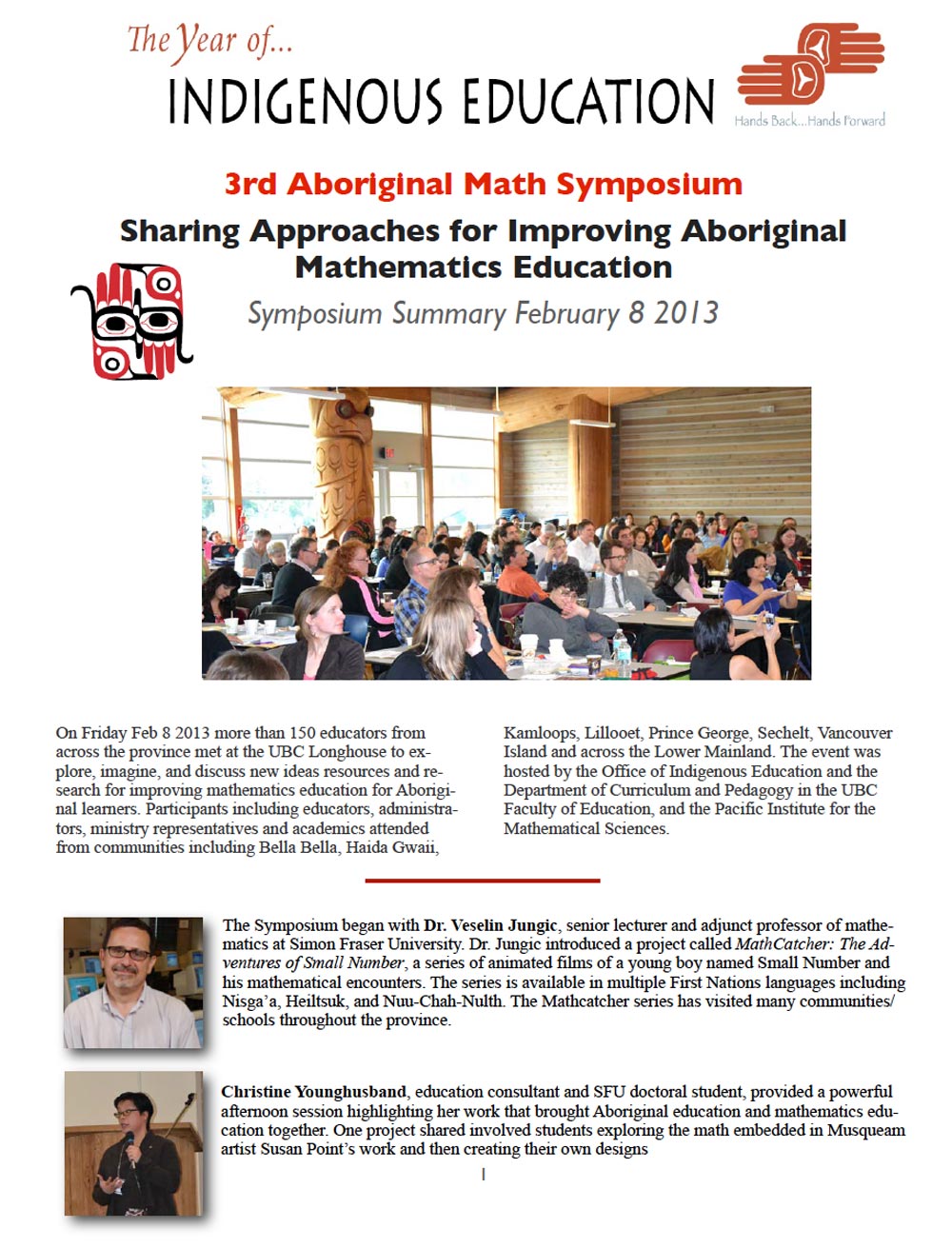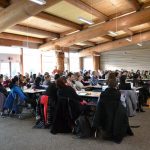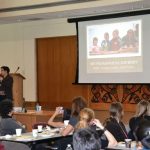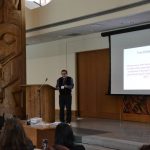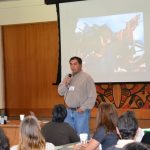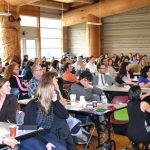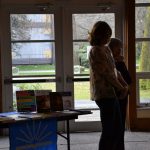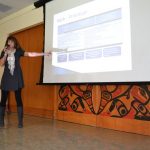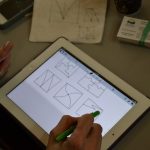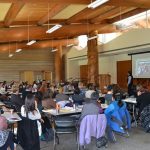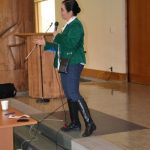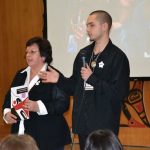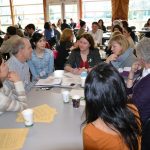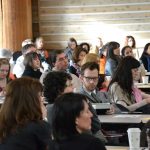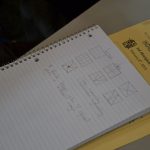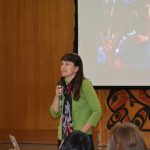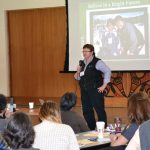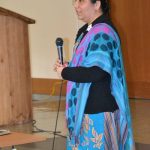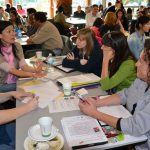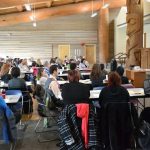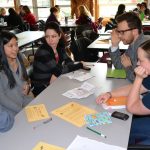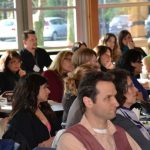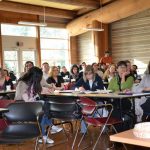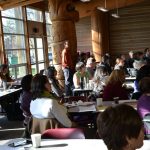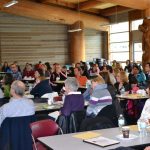Sharing Approaches for Improving Aboriginal Mathematics Education
Elaine Colgate, Ministry of Education, presented BC’s new curriculum design features for K-12 for a more conceptually based curriculum that embeds Aboriginal voice throughout. http://www.bced.gov.bc.ca/irp/transforming_curriculum.php.
Latika Raisinghani, PhD student, Faculty of Education, Department of Curriculum & Pedagogy, presented a project that explored mathematics in Kosraean Weaving (Micronesia).
Paul Beland, Lillooet School District presented a teacher resource for Math 8 that includes cultural and place connects using a photo and math question for each of the Math IRPs.
Gerry Mulligan, Bella Bella Community School, provided ideas for inviting community members into the classroom to speak about their work and the role of mathematics.
Liz Barrett, JUMP Math, shared a video clip of John Mighton, founder of JUMP Math and presented key aspects of the JUMP program.
John Hamel, Howe Sound Secondary, Squamish School District shared ideas that focused on the need to develop First Nations youth’s sense of belonging so that they are “culturally-intact” and prepared for post-secondary education.
Noreen Pankewich, Kamloops School District, District Resource Centre, shared ideas for lesson templates for Aboriginal themes and lessons.
Joanne Yovanovich, District Principal of Aboriginal Education Haida Gwaii and Billy Yovanovich, Haida artist introduced the book Tluuwaay Waadluxaan Mathematical Adventures as a resource that connects math, community and culture.
Christine Younghusband, education consultant and SFU doctoral student, provided a powerful afternoon session highlighting her work that brought Aboriginal education and mathematics education together. One project shared involved students exploring the math embedded in Musqueam artist Susan Point’s work and then creating their own designs.
The Symposium concluded with small group discussions around the questions: 1) How can Aboriginal education and mathematics education work in productive conversation? 2) What more do we need to know to improve Math education for Aboriginal learners? and 3) What goals should the BC K-12 Aboriginal Math Network undertake?
The Aboriginal Math Network blog was also launched and we hope it will be used for current ideas and lessons, resources and events focusing on Aboriginal mathematics education.
Featured Speaker’s Bios:
Dr. Veselin Jungic
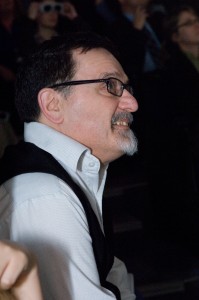 As an author of the Math Catcher: Mathematics Through Aboriginal Storytelling project, Dr. Jungic will
As an author of the Math Catcher: Mathematics Through Aboriginal Storytelling project, Dr. Jungic will
share insights on the creation of a series of short animated films that accompany picture books and
activities designed to introduce math topics and techniques through stories that follow Aboriginal
storytelling formats and contain elements of Aboriginal traditions and cultures. In 2012 the Math Catcher Outreach Program visited several schools on and off reserves, from Nanaimo, B.C. to Oliver, B.C. with the main goal to give an early positive experience with mathematics to students from K-12. In this presentation Dr. Jungic will share his experience from those visits with the audience.
One aspect of the program includes creating math related animated films in various First Nations’ languages.
We will show several short clips from those films and present our personal view about the role of culture in presenting mathematics.
Dr. Veselin Jungic, Department of Mathematics, Simon Fraser University website
Christine Younghusband, EdD Candidate
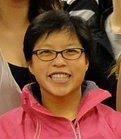 “Math Embedded and Professional Learning”
“Math Embedded and Professional Learning”
Professional learning is ongoing for practicing K-12 teachers. This presentation will describe my professional learning experiences as a secondary mathematics teacher implementing and integrating aboriginal content with the BC Math 8/9 curriculum. The project titled “Susan Point – Math Embedded” implemented two years ago involved team teaching, technology, cross-curricular collaboration, and Assessment for Learning strategies. The project took a life of it’s own. Students found personal relevance, they were intrinsically motivated, and they were engaged in self-directed learning practices. Professional learning requires a willingness to try, an openness to learn, and a safe-learning environment. This is particularly difficult for teachers who do not have a formal training in the subject area. This is known as out-of-field teaching. In my case, I did not have a formal background in aboriginal education. Conversely, aboriginal education teachers may not have a formal background in mathematics. How can aboriginal education and secondary mathematics teachers collaborate to form a partnership to unify the content areas together as one?
Younghusband Consulting website
BIO:
Christine is an independent educational consultant, full-time graduate student at SFU, and school trustee with the SD46 Board of Education. She graduated from UBC with a Bachelor of Science and Bachelor of Education in 1993 and 1994. Christine has 15 years of experience teaching secondary mathematics on the Sunshine Coast and held teacher leadership roles such as mathematics department head, school professional development representative, and learning community team leader. She has a Master of Education in Curriculum and Instruction from SFU completed in 2001 and continues her doctoral studies in Educational Leadership. Christine is passionate about K-12 mathematics education, teacher professional development, and student success. Her research is focused on professional learning, out-of-field teaching, and mathematics education. Christine continues her work in mathematics education with the BC Association of Mathematics Teachers Executive; she is a site assistant at SFU supporting a Master of Education cohort in educational leadership; and, she enjoys tutoring mathematics at Capilano University on the Sunshine Coast.
(Aboriginal Math Symposium Summary 2013)
On Friday Feb 8 2013 more than 150 educators from across the province met at the UBC Longhouse to explore, imagine, and discuss new ideas resources and research for improving mathematics education for Aboriginal learners. Participants including educators, administrators, ministry representatives and academics attended from communities including Bella Bella, Haida Gwaii, Kamloops, Lillooet, Prince George, Sechelt, Vancouver Island and across the Lower Mainland. The event was hosted by the Office of Indigenous Education and the Department of Curriculum and Pedagogy in the UBC Faculty of Education, and the Pacific Institute for the Mathematical Sciences.
The Symposium began with Dr. Veselin Jungic, senior lecturer and adjunct professor of mathematics at Simon Fraser University. Dr. Jungic introduced a project called MathCatcher: The Adventures of Small Number, a series of animated films of a young boy named Small Number and his mathematical encounters. The Mathcatcher series has visited many communities/schools throughout the province and is available in multiple First Nations languages including Nisga’a, Heiltsuk, and Nuu-Chah-Nulth.
A well-received feature of the Symposium was the Plenary Sharing session where participants shared highlights of their projects, research, activities and questions. This year short presentations were given by eight participants.
February 8, 2013, 9:00 am – 3:00 pm.
UBC First Nations Longhouse (1985 West Mall)
Purpose:
The 3rd Aboriginal Math K-12 Symposium is an opportunity for teachers, administrators, Ministry representatives, community members, and academics to connect, explore, imagine and share new ideas, resources and research on Aboriginal mathematics education from kindergarten to Grade 12.
- Learn about new research in mathematics and Aboriginal education
- Discuss and share approaches, research and educational projects for improving Aboriginal math education
- Develop community connections to facilitate and support improving Aboriginal math education
- Participate in building an Aboriginal Math K-12 province-wide network
9:00 – 9:30 am. Pick up registration material. Coffee/Tea available. Meet & Greet. Introductions
9:30 – 10:15 am Veselin Jungic, Mathematics Department, Simon Fraser University
Math Catcher: Mathematics Through Aboriginal Storytelling
As an author of the Math Catcher: Mathematics Through Aboriginal Storytelling project, Dr. Jungic will share insights on the creation of a series of short animated films that accompany picture books and activities designed to introduce math topics and techniques through stories that follow Aboriginal storytelling formats and contain elements of Aboriginal traditions and cultures. In 2012 the Math Catcher Outreach Program visited several schools on and off reserves, from Nanaimo, B.C. to Oliver, B.C. with the main goal to give an early positive experience with mathematics to students from K-12. In this presentation Dr. Jungic will share his experience from those visits with the audience. One aspect of the program includes creating math related animated films in various First Nations’ languages. Several short clips from those films will be presented for discussion.
Dr. Jungic is a senior lecturer and adjunct professor of mathematics at Simon Fraser University. His outstanding teaching is recognized through numerous awards including the Canadian Mathematics Society Excellence in Teaching Award 2012, the PIMS Education Prize 2011 and SFU Excellence in Teaching Awards in 2005 and 2007.
10:15 – 10:30 am. Refreshment Break
10:30 – 12:00: Plenary – Sharing Project Information (participants who sent in an expression of interest –10 minutes each).
12:00 – 12:45 pm. Lunch is provided
12:45 – 1:30 pm. Christine Younghusband, educational consultant, school trustee, graduate student.
Math Embedded and Professional Learning
Professional learning is ongoing for practicing K-12 teachers. This presentation will describe my professional learning experiences as a secondary mathematics teacher implementing and integrating aboriginal content with the BC Math 8/9 curriculum. The project titled “Susan Point – Math Embedded” implemented two years ago involved team teaching, technology, cross-curricular collaboration, and Assessment for Learning strategies. The project took a life of it’s own. Students found personal relevance, they were intrinsically motivated, and they were engaged in self-directed learning practices. Professional learning requires a willingness to try, an openness to learn, and a safe-learning environment. This is particularly difficult for teachers who do not have a formal training in the subject area. This is known as out-of-field teaching. In my case, I did not have a formal background in aboriginal education. Conversely, aboriginal education teachers may not have a formal background in mathematics. How can aboriginal education and secondary mathematics teachers collaborate to form a partnership to unify these content areas as one?
Christine is passionate about K-12 mathematics education, teacher professional development, and student success. Her research is focused on professional learning, out-of-field teaching, and mathematics education. Christine continues her work in mathematics education with the BC Association of Mathematics Teachers Executive; she is a site assistant at SFU supporting a Master of Education cohort in educational leadership; and, she enjoys tutoring mathematics at Capilano University on the Sunshine Coast.
1:30 – 2:15 pm. Small group discussion.
1. How can Aboriginal education and mathematics education work in productive conversation?
2. What more do we need to know to improve Math education for Aboriginal learners?
3. What goals should the BC K-12 Aboriginal Math Network undertake?
2:15 – 3:00 pm. Plenary discussion
Sponsors: Indigenous Education Institute of Canada-UBC Faculty of Education; Pacific Institute for the Mathematical Sciences (PIMS); Department of Curriculum and Pedagogy UBC.
Hosts: Jo-ann Archibald, Cynthia Nicol – UBC Faculty of Education; & Melania Alvarez-Adem, PIMS
